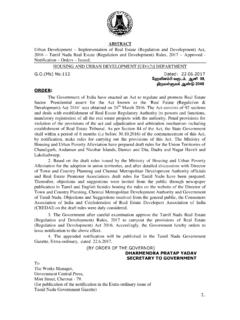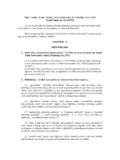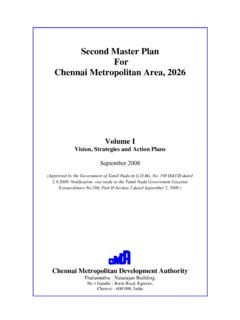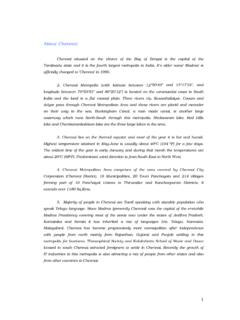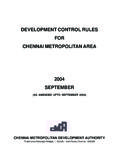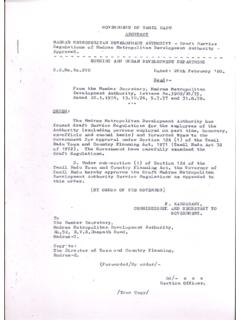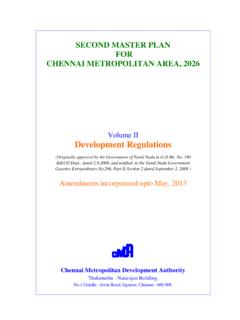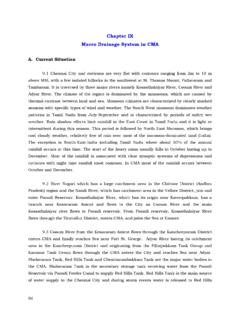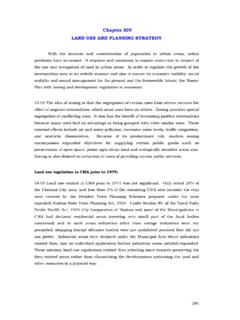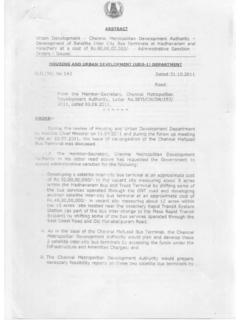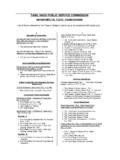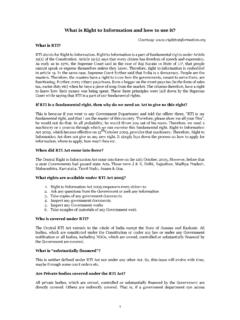Transcription of CHENNAI METROPOLITAN DEVELOPMENT …
1 CHENNAI . METROPOLITAN . DEVELOPMENT . AUTHORITY. THE INFORMATION HAND BOOK. UNDER RIGHT TO INFORMATION ACT. CONTENTS. Chapter No Description 1 Introduction 2 Particulars of organization Functions and Duties. 3 Powers and Duties of Officers and Employees 4 Rules, Regulations, Instructions, Manual and Records, for Discharging Functions. 5 Particulars of arrangement that exists for consultation with or representation by the members of the public in relation to the formulation of its policy or implementation thereof 6 A Statement of the categories of documents that are held by it or under its control. 7 A Statement of boards, council, committees and other bodies constituted as its part. 8 The Names, Designation and other particulars of the Public Information Officers. 9 Procedures followed in Decision Making Process. 10 Directory of Officers 11 The Budget Allocated to each Agency. (Particulars of all plans, proposed expenditure and reports on disbursement made.)
2 12 The Manner of Execution of Subsidy Programme. 13 Norms set by CMDA for the discharge of its functions. 14 Information available in an electronic form. 15 Particulars of the facilities available to citizens for obtaining information. 16 Projects of CMDA. CHAPTER 1. INTRODUCTION. Right to information is a fundamental Right. It is part of the Fundamental Right to freedom of speech and expression recognized in the constitution and various Supreme Court decisions. The Right is guaranteed in Universal Declaration of Human Rights and Article 19 and 21 of the constitution of India. All the years' public has had problems in accessing information due to culture of secrecy, lack of accountability, badly maintained records and illiteracy of the people. In order to setout practical regime of right to information and to promote transparency and accountability in the working of every public authority, the Government of India have enacted the Right to Information Act, 2005 (Central Act 22 of 2005).
3 The summary of the Act, Applies to public authorities, Establishes statutory right to information. To every citizen who applies for information Setout exemptions from the right Provides for the release of exempt information in public interest. Requires public authority to produce publications schemes Establishes Independent structure of appeal and penalty Establishes Information Commission. The public Information Officers designated by the Public Authority will provide information to the persons requesting under this Act. This Hand book is intended for the use of the public those who seek any information on CMDA. This book will promote transparency and accountability in the working of CMDA to every public as under the Right to Information Act. CHAPTER 2. PARTICULARS OF ORGNIZATION, FUNCTIONS AND DUTIES. CONSTITUTION : CHENNAI METROPOLITAN DEVELOPMENT Authority (CMDA) is a statutory body constituted under the Town and Country Planning Act, 1971, as amended by TamilNadu Act 22 of 1974.
4 The Authority was initially set up as an adhoc body by , RDLA, dated and it acquired statutory status on ( , H&UD Dept. (H&UD ) Department of the Government of TamilNadu (GTN). JURISDICTION: CHENNAI METROPOLITAN DEVELOPMENT Authority has jurisdiction over the CHENNAI METROPOLITAN Area (CMA) covering 1189 Which includes CHENNAI City, 16 Municipalities, 20 Town Panchayat, 10 Panchayat Unions and 2. Cantonments. OBJECTIVES: The main objectives of the Authority are: a) Planning for physical, infrastructure and economic DEVELOPMENT of the CMA. b) Implementing the Master Plan for CMA and enforcing the DEVELOPMENT Control Rules framed under the Master Plan. c) Formulating, co-ordinating and implementing projects for METROPOLITAN DEVELOPMENT . OUR MISSION: Improving environmental quality as well as quality of life in CMA through the planning process and implementation of plans and urban DEVELOPMENT projects. ORGANISATION: CMDA consists of 7 functional units viz.
5 I. Area Plans Units (APU). II. Area DEVELOPMENT Unit (ADU). III. Master Plan Unit IV. Project Management Unit V. Enforcement Cell VI. Construction Wing VII. General Unit Also supported by Administration and Accounts Wings. The total number of employees of the Authority 776. The organization chart of CMDA is annexed. COMMITTEES: The Authority has constituted the following committees to assist in its deliberations. I. Administrative and Finance Committee II. Technical Committee ADDRESS: CHENNAI METROPOLITAN DEVELOPMENT Authority , Gandh-Irwin Road, Egmore, CHENNAI -600 008. Tamil Nadu, India. For more details please visit our web site: Website: Email: Office Hours: to CHAPTER-03 (MANUAL-02). POWERS AND DUTIES OF OFFICERS AND EMPLOYEES. DELEGATION OF POWERS TO MEMBER SECRETARY. Part-1 Administrative: 1. To accept the resignation of the persons in the posts for which Member- Secretary is the appoint authority. 2. To sanction all kinds of leave to the Officers and Staff in accordance with rules.
6 3. To impose all punishments for good and sufficient reasons on all officers and staff in the posts for which Member-Secretary is the appointing authority. 4. To depute officers and employees for seminars any where in India. 5. To permit any employee of the Authority to proceed on duty to any partof India with the permission of Chairman. 6. To sanction all kinds of allowances and advances to all the officers and staff including medical reimbursement according to the government Rules for corresponding posts 7. To authorize travel by air or by train in a class of accommodation higher than to which an employee of the authority is entitled with the concurrence of the Chairman. 8. To sanction periodical increments to all the officers and staff in the posts for which Member-Secretary is the appointing authority. 9. To order disbursement of Pay and Allowances of the staff employed under the Authority and to draw his own pay and allowances as admissible.
7 10. To sanction honoraria to staff etc., conducting training courses and other courses arranged by the Authority and to sanction stipends to the persons undergoing such training according to rules to be approved by the Authority. 11. To fix working hours of the Authority and the holidays of the Authority within the frame work of Government policy. 12. To participate in Seminars, Conferences or meeting in India with the permission of the Chairman and to meet all expenditure connected there with. Part-II Financial Division Personnel 13. To grant charge allowance for a period not exceeding 3 months, subject to the provisions of Fundamental Rules. 14. To sanction all contingent charges. Purchase and Operation 1. To sanction the purchase of Stationery articles, drawing materials and instruments subject to the financial powers of ,000/- at a time within the budget provision. (Financial limit enhanced to ,000/- at a time within the budget provision vide , dt.)
8 (Enhanced to ,000/- vide , dated ). 2. To sanction expenditure on furniture, stationery and all kinds of office equipment and installations up to an extent of ,000/- at a time subject to the provisions in the budget of the authority. (Financial limit enhanced to ,000/- at a time subject to budget provision vide , dated ). (Financial limit again enhanced to ,000/-j at a time subject to the budget provision vide , dt. )(Enhanced to lakhs vide dated ). 3. To sanction installation of telephones in the office of the Authority only(and also in the residence of the Officers as per eligibility vide dated ). 4. To sanction repairs to the furniture and repairs of the vehicles of this Authority subject to an annual limit of ,000/-. (Financial limit to sanction repairs to the furniture enhanced to an annual limit to ,000/- subject to budget provision vide , dated ). 5. To incur expenditure on maintenance and repair of the vehicles of the Authority. 6.
9 To incur expenditure on printing. 7. To sanction expenditure on advertisement. 8. To purchase materials at controlled rates without calling for tenders subjects to budget provision. The purchase should, however, be according to the rate contract system adopted by the Director General of Supplies and Disposals. 9. To make payments up to 90% against proof of dispatch required in connection with the purchase. 10. To invite, accept and award contracts with regard to limited tenders for work and purchase of stores up to a limit of ,000/- in respect of the schemes approved by the Authority for the reasons to be recorded in writing. (Enhanced to lakhs for the purchase of stationery articles, drawing materials, instruments, etc., at a time within the suggest provision. 11. To adopt single tender system for purchase of stores and execution of works up to a limit of ,000/- for the reasons to be recorded in writing. 12. To declare stores, equipment, machinery, vehicles etc.)
10 , as unserviceable or obsolete, to fix their prices and prescribe the mode of their disposal with reference to the rules. LOSSES: 1. Sanction claims for demurrage; wharf age etc., up to in each individual case. (Enhanced to , 000/- in each case subject to budget provision vide dated ). 2. To write off losses due to thefts and negligence up to an extent of at a time subject to an annual limit of ,000/- for reasons to be recorded in writing (Enhanced to ,000/- in each case annual limit of ,000/- subject to budget provision vide , dated ). 3. To waive earnest money, security deposits, Bank guarantee etc., not exceeding ,000/- for good and sufficient reasons. (Enhanced to ,000/- subject to Budget provision vide dated ). 4. To exempt firms and contractors of established, repute and reliability from the execution of agreement if the value of the order of work does not exceed ,000/-. GENERAL: 1. To sanction purchase of books, journals and periodicals.
